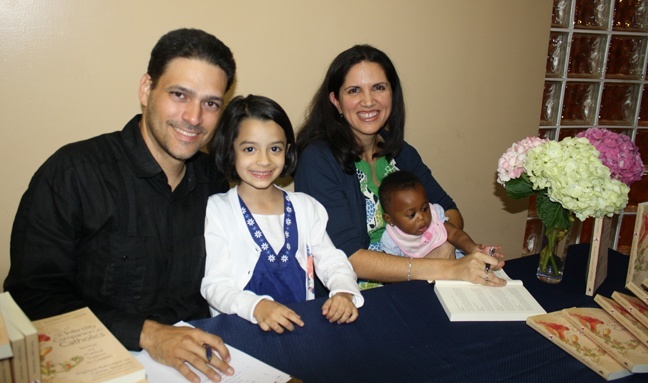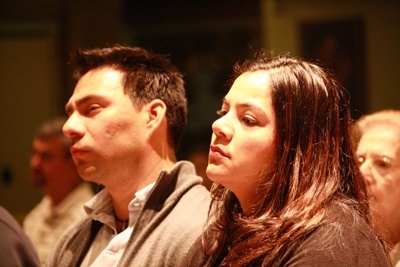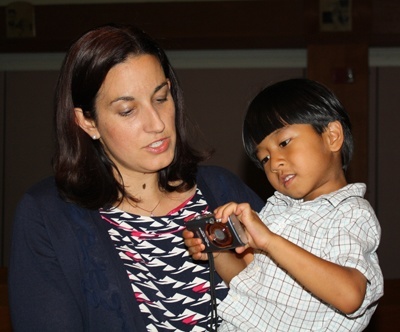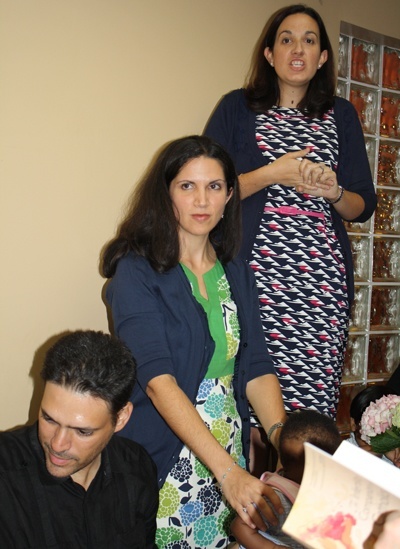By Anne DiBernardo - Florida Catholic

Photographer: ANNE DIBERNARDO | FC
Carmen Santamaria with her husband Alejandro, and their daughters Monica, 6, and Victoria, 8 months.

Photographer: ANNE DIBERNARDO | FC
A couple takes part in the first Mass of prayer and intercession for couples struggling with infertility, celebrated April 19 at St. Timothy Parish in Miami.
Perhaps those most sensitive to this truth are couples who are unable to conceive a child.
Recognizing that the Church community should do more to offer its support to couples experiencing infertility and pregnancy-related difficulties, the archdiocese�s Family Life Office teamed up with two local Catholics, Angelique Ruhi-Lopez and Carmen Santamar�a, to offer the first-ever Mass of hope and encouragement for those touched by infertility.
Ruhi-Lopez, formerly a staff writer for La Voz Cat�lica, the archdiocese�s Spanish-language newspaper, and Santamar�a, an attorney, have just co-authored a book, �The Infertility Companion for Catholics,� aimed at providing �spiritual and practical support� for couples bearing the cross of infertility.

Photographer: ANNE DIBERNARDO | FC
Angelique Ruhi-Lopez holds her son, Emmanuel, 5, at the end of the Mass.
Also serving at the altar was Deacon Norman Ruiz-Casta�eda of Epiphany Parish, who preached an inspired homily to about 150 people who came from all corners of the archdiocese to take part in the Mass.
�Here I am an unworthy servant to talk to you about infertility because God has blessed me with six kids and five grandchildren, and who am I to know the pain in your heart and the difficulties that each of you bear?� said the deacon, a pediatrician who is well-versed on the subject of Natural Family Planning and morally permissible avenues of reproductive technology.

Photographer: ANNE DIBERNARDO | FC
Co-authors Angelique Ruhi-Lopez, rear, and Carmen Santamaria speak at the book signing that followed the Mass. Santamaria's husband, Alejandro, is below in front.
A light reception followed the Mass in which infertility-related resources were distributed. Ruhi-Lopez and Santamar�a, who are also best friends, were on hand to sign copies of their book, which was written in response to their desire to help faithful Catholics contend with the struggles of infertility.
�It�s been a book that is difficult to put down because it literally says everything,� Deacon Ruiz-Casta�eda said.
In addition to discussing how to bear the cross of infertility, the book addresses topics such as: what the Church teaches on infertility; miscarriage; infertility�s effect on marriage; reproductive technology; treatment options; adoption options; how family and friends can help; and a male perspective on infertility.
Both women have personally struggled with the challenges of infertility.
Ruhi-Lopez, who has a master�s degree in theology from Boston College, experienced infertility about six years ago when she and her husband, Richard, were trying to conceive their first child. She knew that the Church had a position on treatments but did not know the details so she looked up what the Church had to say on the topics of in vitro fertilization and artificial insemination.
�I started to do some research with the intention of writing a book but I put it all on the back burner when we started the adoption process,� she said.
The couple adopted their first child, Emmanuel, 5, from Vietnam. They later had three biological children, Sebastian, 4, and twins Madeleine and Anabella, 3.
Three years ago, when Santamar�a started having problems with infertility, she and Ruhi-Lopez went looking for a book that would address all of their questions. When they could not find anything, they decided to write their own.
The friends view their book as a teaching opportunity � to share what the Church teaches on infertility and morally acceptable treatment options � as well as a way of providing encouragement and hope to Catholic couples struggling with the inability to have children.
Unfortunately, some couples are berated by family and friends for not taking advantage of modern medicine. But Ruhi-Lopez said the Church upholds the dignity of every human being by teaching that any treatment that replaces the marital act, such as in vitro fertilization and artificial insemination, is intrinsically wrong.
Sara Gonzalez, a St. Timothy parishioner and co-coordinator for Marriages in Victory, attended the Mass to show support for her friend, Ruhi-Lopez.
�It is hard to see someone you care about suffer like this when you have been blessed with the gift of fertility. I wish I could share my fertility. It is very hard to see them suffer the way they do. Sometimes they feel so desperate and have difficulty trusting but then you watch them give themselves up to the will of God,� Gonzalez said.
�It�s a difficult road,� said Santamar�a�s husband, Alejandro. �It�s hard to talk about it, especially with other men. I couldn�t go through it without my wife�s love, prayers and support.�
The Santamar�as have two biological children, Monica, 6, and Antonio Javier, 4, and two adopted children, twins Victoria and Daniel, who are 8 months old. They experienced more than three years of secondary infertility following the birth of their second child and continue to face this challenge.
Ruhi-Lopez and Santamar�a hope the Mass will become an annual event so that couples experiencing infertility will know that the Church prays for them and is there for them.
�The Infertility Companion for Catholics� is available through Ave Maria Press. The authors also have a website, catholicinfertilityjourney.com.

